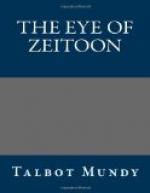“Sleepy hollow!” said Fred, and as he spoke his horse pitched forward, almost spilling him; the rope that held the prisoners in tow was all that saved the lot of them from rolling down-hill. Fred dismounted, and drove the horse in front of him with a slap on the rump, but the beast was almost too sleepy to make the effort to descend.
There was no taint of gas or poison fumes. The air tasted fresh except for the faint smoke, and the birds were all in full song. Yet we all had to dismount, and to let the prisoners walk, too, because the horses were too drowsy to be trusted. The path that zigzagged downward to the village was dangerous enough without added risk, and the eight Armenian riflemen refused point-blank to lead the way unless they might drive the animals ahead of them.
Even so, neither we nor they were properly awake ,when we reached the village. We tied up the horses in a sort of dream—fed them from instinct and habit—and made our way to the hut Will had pointed out like men who walked in sleep.
Nobody was keeping watch. Nobody noticed our arrival. Men and women were sleeping in the streets and under the eaves of the little houses. Nothing seemed awake but the stray dogs nosing at men’s feet and hunting hopelessly among the bundles.
The little house Will had reserved for our use contained a stool and a string-cot. On the stool was food—cheese and very dry bread; and because even in that waking dream we were conscious of hunger, we ate a little of it. Then we lay down on the floor and fell asleep—we, and the prisoners, and the eight Armenian riflemen. Within a quarter of an hour Will followed us into the house, but we knew nothing about that. Then he, too, fell asleep, and until two or three hours after dark we were a village of the dead.
To this day there is no explaining it. Certainly no human watch or ward saved us from destruction at the hands of roving enemies. I was awakened at last by a brilliant light, and the effort made by our two prisoners, still tied together, to crawl across my body. I threw them off me, and sat up, rubbing my eyes and wondering where I was.
In the door stood Kagig, with a lantern in his right hand thrust forward into the room. His eyes were ablaze with excitement, and between black beard and mustache his teeth showed in a grin mixed of scorn and amusement.
Next I beard Will’s voice: “Jimminy!” and Will sat up. Then Fred gave tongue:
“That you, Kagig? Where’s Monty? Where’s Lord Montdidier?”
Kagig strode into the room, set the lantern on the floor, struck the remnants of the food from off the little stool, and sat down. I could see now that he was deathly tired.
“He is in Zeitoon,” he answered.
Noises from outside began then to assert themselves in demonstration that the village was awake at last—also that the population had swollen while we slept. I could hear the restless movement of more than twice the number of horses we had had with us.




